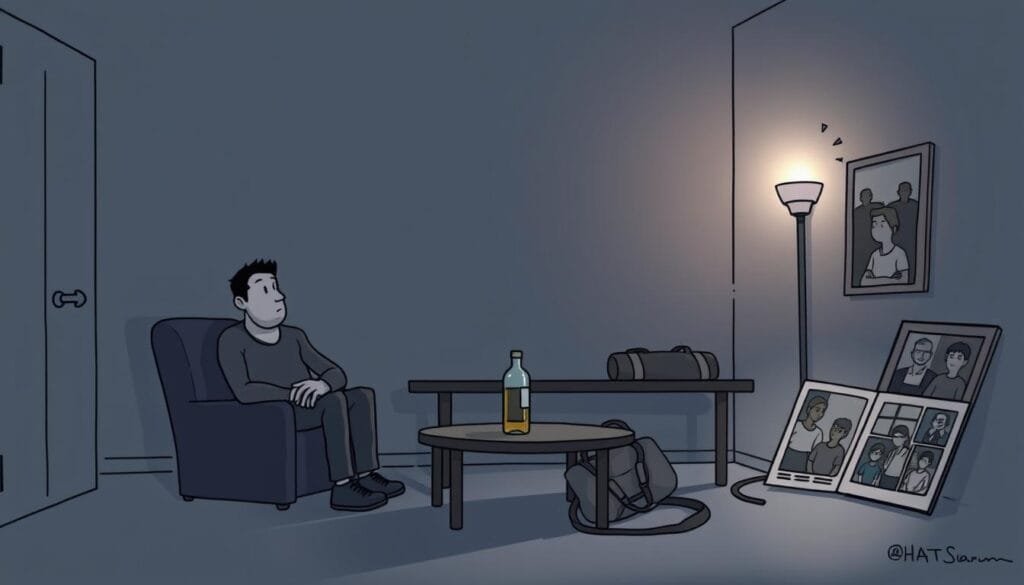Your mental health is as vital as your physical health, especially for men. Dr. Chandril Chugh, a top neurologist, knows how crucial mental health is. He works hard to make sure everyone knows about men’s mental health.
Dr. Chugh has moved from the U.S. to leading a big neurology program in Delhi, India. He’s seen how mental health problems affect people and communities, especially where care is hard to find. He wants to help all men get the support they need for their mental health.
Dr. Chugh has seen how tackling mental health can change lives. He talks openly about mental health, fights stigmas, and offers proven treatments. He’s helping men take charge of their mental health and live better lives. Let’s look at why men’s mental health is so important and how you can care for your own.
Table of Contents
ToggleUnderstanding the Importance of Men’s Mental Health
Men’s mental health is key but often ignored. Mental health issues might seem more common in women. But, the effects on men are just as big. It’s vital to focus on men’s mental health for a balanced life.
The Prevalence of Mental Health Issues in Men
Men are less likely to get help for mental health problems than women. This can lead to serious issues, like suicide rates being four times higher for men.
Men often try to handle mental health issues by themselves. This can include substance abuse and compulsive gambling. Ignoring mental health can harm men’s physical health too, like raising the risk of heart disease.
The Impact of Mental Health on Men’s Overall Well-being
Ignoring men’s mental health can hurt a lot. It can make job performance drop and relationships suffer. By focusing on self-care and mindfulness, men can improve their mental health.
It’s important to talk openly about men’s mental health. Events like Men’s Mental Health Month in June help raise awareness. They encourage men to seek help without shame.
Recognizing the Signs of Mental Health Struggles
It’s key to spot early signs of mental health issues in men. Each person’s experience is different. Yet, there are common symptoms men often show. Knowing these signs helps you know when to get help.
Common Symptoms of Mental Health Disorders in Men
- Persistent feelings of sadness, hopelessness, or irritability
- Difficulty regulating emotions, leading to sudden outbursts or aggressive behavior
- Excessive stress, anxiety, or constant worrying
- Withdrawal from social activities and relationships
- Difficulty concentrating or making decisions
- Changes in sleep patterns, such as insomnia or oversleeping
- Significant weight fluctuations, either weight gain or loss
- Increased alcohol or substance abuse as a coping mechanism
- Reckless or impulsive actions, such as risky sexual behavior or financial decisions
- Suicidal thoughts or attempts
Men’s mental health symptoms can be different from women’s. Societal expectations of masculinity can make it hard for men to show their feelings. But, it’s vital to address these issues to keep well-being and prevent things from getting worse.

If you or someone you know shows these signs, getting help is crucial. Mental health experts can help with a plan and guide you. Remember, asking for help is a sign of strength, not weakness. It’s important for a better life.
Breaking the Stigma: Addressing Mental Health Challenges
It’s key to tackle the stigma around men’s mental health. Many men face mental health issues but fear being judged. We need to help them feel okay to seek help.
Men often don’t get help for mental health problems. This can make things worse and increase risks. Issues like depression, anxiety, and substance abuse are common. Spotting signs like feeling hopeless or worried is the first step.
- Societal pressures, lack of emotional support, and traditional gender norms can contribute to men’s reluctance to address mental health challenges.
- Men are more likely to die by suicide, often due to untreated or undiagnosed mental health conditions.
- Chronic stress from work, family, finances, or health concerns can take a toll on men’s mental well-being.
We need to make a safe space for men to talk about their mental health. Getting help shows strength and a desire to get better.
By tackling men’s unique challenges and raising awareness, we can end the silence. Together, we can help men focus on their well-being. Let’s work to remove the stigma and offer the support they need.
Cognitive Behavioral Therapy: An Effective Approach
Cognitive Behavioral Therapy (CBT) is a top choice for mental health issues. It works by changing thought patterns to improve feelings and actions. This therapy is backed by science and helps people tackle their problems head-on.
The Cognitive Model: Understanding Thought Patterns
CBT’s core idea is the cognitive model. It shows how thoughts, feelings, and actions are connected. People with mental health issues often have negative thoughts that make things worse.
CBT helps them see these thoughts in a new light. It teaches them to question and change these negative patterns.
Exposure Therapy: Confronting Social Fears
Exposure therapy is a big part of CBT for social anxiety. It helps people face their fears in a safe way. This builds confidence and teaches them to handle social situations better.
CBT is proven to work well for mental health. Studies show it can help up to 75% of people feel better. It’s a hands-on way to improve mental health and well-being.

Mindfulness and Self-Awareness in Mental Health
Mindfulness is a powerful tool for men’s mental health. It helps them stay present and aware without judgment. This is especially helpful for those dealing with social anxiety.
Mindfulness makes men more aware of their thoughts, feelings, and body signals. This self-awareness helps them find the source of their social anxiety. They can then deal with it in a better way.
It also teaches self-compassion, which is key when facing social fears. Men learn to be kind to themselves. This helps them face challenges with a positive mindset.
Mindfulness-based practices, like mindfulness cards, help men explore their emotions. These tools are easy to use and help men develop emotional strength. They provide a safe space for mindfulness exercises.
By focusing on mindfulness and self-awareness, men can improve their mental health. This approach, along with a healthy lifestyle and support, helps men overcome mental health challenges.
Mindfulness and self-awareness are key to better mental health for men. These practices offer valuable insights and strategies. They help men improve their overall well-being.
Men’s health and mental health: A Holistic Approach
Men’s health is about both their body and mind. Dr. Chandril Chugh says it’s key to look at both together. He finds that this way, his patients get better results.
He notes that men often don’t go to the doctor as much as women. This can make them more likely to get sick. He thinks treating both mind and body is the best way to help.
He knows that mental and physical health are linked. Stress and anxiety can hurt a man’s health. But, being active, eating right, and sleeping well can help his mind.
He wants to help men feel better overall. He suggests activities like mindfulness and meditation to manage stress. He also says having friends and family is important for mental health.
In short, His approach is vital for men’s health. By focusing on both mind and body, he helps men live better lives. This leads to better health and happiness.

The Role of Support Systems and Resources
Building a strong support network is key for managing mental health, especially for men. They might feel shy about getting help. Talking to trusted friends, family, or community resources can really help.
Building a Support Network for Men’s Mental Health
Here are some ways to build a supportive environment for your mental health:
- Find close friends or family who can listen and support you. Tell them about your struggles.
- Look for local or online support groups. Sharing your story can make you feel less alone.
- Do activities or hobbies that help you meet new people. Join a sports team, volunteer, or help with men’s mental health.
- Get help from a mental health expert like a therapist. They can offer specific advice and support.
You don’t have to go through this alone. Building a support network gives you access to the help you need for your mental health.
Lifestyle Changes for Improved Mental Well-being
Keeping a healthy lifestyle is key for your mental health. Dr. Chandril Chugh, a top expert in men’s health, says yoga, breathing exercises, and doing good deeds help. These actions can ease anxiety and bring balance back into your life.
He suggests trying different things to see what works for you. This way, you can care for yourself fully and improve your life’s quality.
Prioritizing Mental Well-being through Lifestyle Changes
Here are some lifestyle changes to help your mental health:
- Do regular physical activities like yoga to lower stress and boost mood.
- Try mindfulness and meditation to grow self-awareness and peace inside.
- Eat well and healthily, as what you eat affects your mind.
- Get enough sleep by following a routine and keeping good sleep habits.
- Do things you love and find meaningful.
- Be around supportive friends and family.
- Help others by volunteering or doing kind acts, which can make you feel good.
By making these changes, you can better your mental health and live a better life.

Seeking Professional Help: When and How
Managing mental health challenges is easier with professional help. Men might feel shy about mental health, but asking for help is brave. It shows you’re strong, not weak.
If you’re feeling angry, aggressive, or thinking about harming yourself, get help. Men often don’t seek mental health treatment. But, your health is important.
Working with therapists or counselors can help. They offer treatments like cognitive behavioral therapy (CBT). This can help you manage your mental health.
Remember, asking for help is brave. It’s a chance to improve your mental health. Don’t wait to get the help you deserve.
Tips for Seeking Professional Help
- Know the signs of mental health issues, like constant worry or trouble focusing.
- Call your doctor or a mental health expert for an appointment.
- Tell your healthcare provider about your feelings and worries.
- Look into different treatments, like therapy or support groups, to find what works for you.
- Take care of yourself with a good diet, exercise, and stress relief.
Seeking help is a brave step for your mental health. It’s an investment in a better future. Don’t hesitate to use the mental health resources available to you.
Conclusion: Prioritizing Men’s Mental Health
Dr. Chandril Chugh’s work shows how vital men’s mental health is. He has seen how mental health issues affect his male patients. He works hard to give them the care they need.
He has learned to manage his own anxiety. He uses a method that looks at physical, emotional, and spiritual health. This approach helps his patients a lot.
He wants to encourage men to care for their mental health. He shares his story and gives tips to help. As a respected doctor, he shows how important it is to focus on men’s mental health.
In the U.S., there’s a growing push to help men’s mental health. Suicide rates and substance abuse are big problems. We need to talk more about these issues and help men get the support they need.
By talking openly and making mental health less scary, we can help men. We can also make sure they have the resources they need. This way, men can live happier, healthier lives.
FAQ
What is Dr. Chandril Chugh’s background and expertise?
Dr. Chandril Chugh is a top neurologist. He cares deeply about neurological health. He has a lot of training and experience.
He worked in the USA and India. He even headed a big neurology program in Delhi. He also worked in rural areas where mental health is a big issue.
Dr. Chugh runs an organization called Dr. Good Deed. It helps with healthcare in rural India. They see over 15,000 patients a year and help 10,000 more through telemedicine.
He has written a book on essential tremors. It helps patients and caregivers.
How does Dr. Chugh view and manage his own experience with anxiety?
Dr. Chugh sees anxiety as a friend. He doesn’t try to avoid it. He lets himself feel it.
He remembers his first anxiety attack when he and his wife were broke. He learned a lot from it. He knows his mind can focus on bad thoughts.
He learned to be kinder to himself. This has helped him a lot.
What strategies does Dr. Chugh recommend to help manage anxiety?
Dr. Chugh suggests several ways to manage anxiety. He recommends meditation and changing your environment.
He also says to practice self-compassion. Yoga and pranayama are good too. Taking breaks and vacations helps a lot.
Doing good deeds can also help. It makes you feel positive.
How effective is Cognitive Behavioral Therapy (CBT) in treating social anxiety disorder?
CBT is very effective for social anxiety disorder. It helps people take back control of their lives.
Studies show that up to 75% of people see a big drop in their anxiety after CBT.
How does mindfulness play a role in CBT for social anxiety?
Mindfulness is key in CBT for social anxiety. It helps people become aware of their thoughts and feelings without judgment.
This awareness helps them understand their anxiety. Mindfulness in CBT can lead to lasting positive changes.
How does Dr. Chugh approach men’s mental health in his practice?
Dr. Chugh takes a holistic approach to men’s mental health. He believes mental health is as important as physical health.
In his practice, he addresses both mental and physical health. He aims to help men achieve better overall health.
What role do support systems and resources play in men’s mental health, according to Dr. Chugh?
Dr. Chugh sees support systems and resources as crucial for men’s mental health. His wife has been a big support for him.
He also relies on his faith and practices like meditation and yoga. He encourages his patients to build a strong support network and seek help when needed.
What lifestyle changes does Dr. Chugh recommend to support improved mental well-being?
Dr. Chugh suggests several lifestyle changes for better mental well-being. He recommends yoga, pranayama, and doing good deeds.
These practices help cultivate calm and positivity. Dr. Chugh believes in holistic self-care for men’s mental health.
When does Dr. Chugh recommend seeking professional help for mental health challenges?
Dr. Chugh says seeking professional help is sometimes necessary. He encourages his patients to recognize signs of mental health struggles.
He advises not to hesitate to reach out for support. Working with mental health professionals is important for evidence-based treatments.
Source Links
About The Author

Medically reviewed by Dr. Chandril Chugh, MD, DM (Neurology)
Dr. Chandril Chugh is a U.S.-trained, board-certified neurologist with expertise in diagnosing and managing neurological disorders, including migraines, epilepsy, Parkinson’s disease, and movement disorders. His clinical focus includes evidence-based neurological care and patient education.
All content is reviewed for medical accuracy and aligned with current neurological guidelines.




